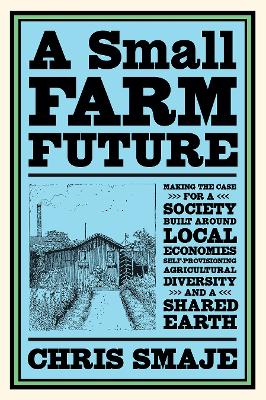Reviewed by annieb123 on
A Small Farm Future is an expository essay in several parts making a case for a fundamental paradigm shift toward self-sufficiency, local economy, and responsible resource allocation and use. Due out 21st Oct 2020 from Chelsea Green Publishing, it's 320 pages and will be available in paperback format.
This is a well written and thorough examination of the current paradigm for food production, resource use, transportation and global interdependency. The introduction includes some background and the genesis of the book along with a cautionary tale about the nature of consumerism told through the parable of the civet cat and the manufacture and trade in kopi luwak coffee.
The first section covers the problems challenging modern civilization: population, climate, energy, soil, water, land, health/nutrition, politics, and culture. The author writes persuasively and confidently, and I found myself nodding along at several places. The only problem is that much (most) of this book feels like "preaching to the choir". For the people who are liberal, compassionate, dreamers, and who want peace love life and prosperity for everyman, this is resounding truth, obvious and undeniable. For the people who are Ayn Rand economic darwinists (altruism = *bad*, unfettered self-interest = *good*) they'll either pop an aneurysm by page 23 or else throw away/burn the book and bury the ashes with a barrowload of garlic at a crossroads somewhere - they're not likely to be swayed from what they believe and they'll continue consuming at a breakneck pace until the inevitable collapse.
That being said, there is quite a lot of information here. There are templates and theoretical gardens for different uses and niches in the locally driven society. The author continues building the thought-picture with the ideas of how these local farms could entertwine to build up local communities which could better withstand the coming contraction from the unsustainable system we are living in currently.
In a number of ways, his writing reminds me of a whimsical cross between Thoreau and John Seymour. For people longing for a better way, this book does have the ring of truth. For people saying "we can't afford that"... they're not likely to be swayed. I think the ideas are important and anyone who is paying any kind of attention sees that as a species we're sailing directly for the rocks, and we have to do something, but I'm not sure how much practical application can be found in this book. It can start the important conversations though, and that's worthwhile.
Four stars. Recommended for self sufficiency readers, smallholders, politicians, sociology readers, and the like. The book includes copious notes and an extensive bibliography and will be a rich source to mine for further information. There's also a cross-referenced index.
Four stars.
Disclosure: I received an ARC at no cost from the author/publisher for review purposes.
Reading updates
- Started reading
- 27 August, 2020: Finished reading
- 27 August, 2020: Reviewed
